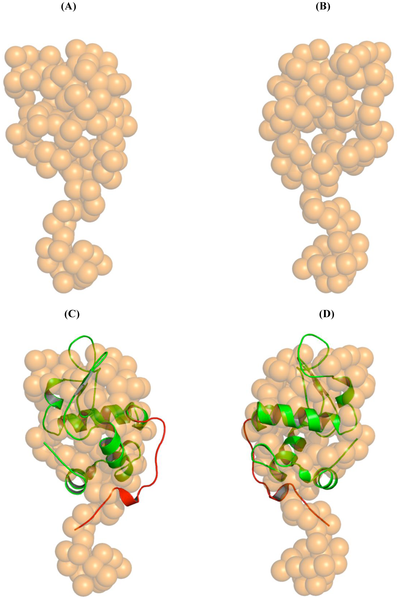A new tumor-killer
May 23, 2013

(A) Low resolution structures of HAMLET in brown spheres and (B) its 180° view. (C–D) Superposition of HAMLET with human α-lactalbumin (PDB id: 1B9O [21]). The C-terminal residues from L105 to L123 of the crystal structure of the human α-lactalbumin, which form a flexible loop in the crystal structure of human α-lactalbumin, are colored red. We suggest that this region L105 to L123 takes up an extended conformation in HAMLET by forming a tail. (Credit: James Ho CS et al./PLoS ONE)
This molecule is based on a natural protein present in human breast milk, which has been found to have strong and wide-ranging tumor killing properties when bound to certain lipids. Lipids are organic molecules like amino acids and carbohydrates, made up of carbon and hydrogen, and help to store energy and to form biological membranes.
The protein-lipid molecule complex is known as HAMLET, which stands for Human Alpha-lactabumin Made Lethal to Tumor cells. It has been proven to be safe and effective, as it only targets tumor cells, leaving healthy human cells intact.
HAMLET has most recently been shown to successfully suppress colon cancer in laboratory mice.
The scientists have also successfully identified and isolated specific components of HAMLET called peptide-oleate bound forms, which have the tumor-killing effect. Peptides are short chain amino acids commonly found in the human body.
These latest breakthroughs are led by Professor Catharina Svanborg and Dr Manoj Puthia from Lund University, Sweden, and Professor Gerhard Grüber from NTU’s School of Biological Sciences. The HAMLET complex was first discovered by Professor Svanborg’s research group.
The researchers found that laboratory mice genetically modified to develop colon cancer were protected to a large extent when fed with HAMLET-laced water. This suggested that HAMLET was killing emerging tumor cells faster than these cells could grow and proliferate.
The ability to recreate HAMLET in synthetic form opens up possibilities of turning it into a drug to kill tumors.
Professor Catharina Svanborg, a medical doctor and scientist, said she had seen promising results from the human trials using HAMLET in Sweden. “We are now ready to test HAMLET as a therapeutic and preventive agent in colon cancer, especially in families with the genetic predisposition, where preventive options are limited,” Svanborg said.
“After completing the various clinical trials, we hope to develop a commercially available product for doctors’ use for cancer treatment in the next five to ten years,” she added.